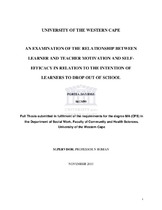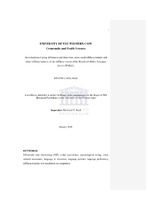| dc.contributor.advisor | Pretorius, Tyrone | |
| dc.contributor.author | Cornelissen, Ronald S. | |
| dc.date.accessioned | 2022-11-02T07:54:46Z | |
| dc.date.available | 2022-11-02T07:54:46Z | |
| dc.date.issued | 2002 | |
| dc.identifier.uri | http://hdl.handle.net/11394/9400 | |
| dc.description | Philosophiae Doctor - PhD | en_US |
| dc.description.abstract | This thesis investigated the effectiveness of cooperative learning, individualistic learning, competitive learning and traditional learning (control group) in promoting more positive intergroup relations in the classroom. The literature and past research supporting the theoretical framework, namely the Contact Hypothesis and Social Identity Theory of Allport and Tajfel were explained. This investigation took place at a high school in the Western Cape. Six grade nine classes were selected. Each class was co-educational and heterogeneous (based on ethnicity). The researcher taught each class. Three questionnaires were used in the research. The Sociometric questionnaire was used to examine intergroup relations. The Attitude questionnaires (Acceptance of Others and Acceptability to Others) were used to measure the acceptance of others by the learner and acceptability to others in the classroom. The Goal Structure questionnaire was used to ensure appropriate use of the various teaching methods by the researcher. Descriptive statistics and chi-square analyses were used to test examine whether there were any differences between cross-gender versus same-gender choices and same-ethnic versus cross-ethnic choices in the various groups.
These statistics indicated that differences between pre-test and post-test were a result of the influence and exposure to treatment. To minimise the dangers of pre-test sensitisation and possible threats to validity a modified Solomon four-group design was used. This design had six groups and allows for the testing of four design requirements (random assignment, effect of pre-test on treatment and effect of pre-test on the post-test results) and, interaction between pre-test and treatment. Two of the design requirements were met namely random assignment and no interaction between pre-test and treatment. A one-way Analysis of Variance (ANOVA) using gain scores indicated
significant differences between the various groups in terms of the least-liked question, acceptance of other-s and acceptability to others. A post-hoc analysis indicated that cooperative learning had a lower mean score than competitive and individualistic learning on the least-liked question. In terms of the attitude questionnaires, (Acceptance of Others and Acceptability to Others) cooperative learning promoted more acceptance of others and more acceptability to others than individualistic learning. None of the other learning groups differed significantly.
The researcher also considered the weaknesses and implications of this thesis as well as giving some recommendations for future investigations. | en_US |
| dc.language.iso | en | en_US |
| dc.publisher | University of the Western Cape | en_US |
| dc.subject | Nomothetic roles | en_US |
| dc.subject | Idiographic | en_US |
| dc.subject | Social identity | en_US |
| dc.subject | Ideology | en_US |
| dc.subject | Religion | en_US |
| dc.subject | Culture | en_US |
| dc.subject | Ethnicity | en_US |
| dc.subject | Western Cape Department of Education (WCED) | en_US |
| dc.subject | Popular learners | en_US |
| dc.subject | Rejected learners | en_US |
| dc.subject | Controversial learners | en_US |
| dc.subject | Neglected learners | en_US |
| dc.subject | Average learners | en_US |
| dc.subject | Acceptability | en_US |
| dc.title | The effect of goal structures on intergroup relations in the classroom. | en_US |
| dc.rights.holder | University of the Western Cape | en_US |




